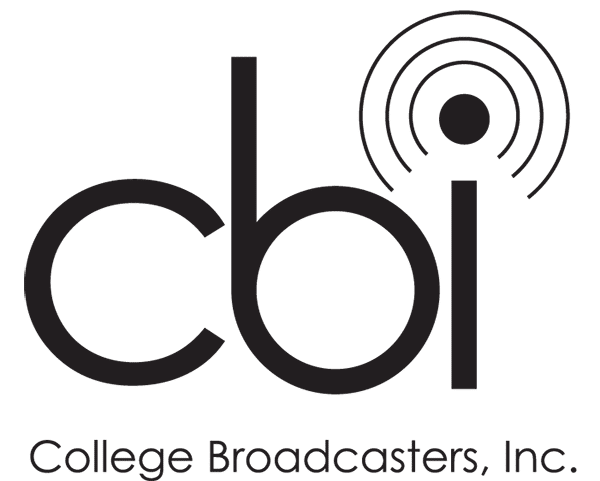April 24, 2014
Station Spotlight: University of Wisconsin-Madison’s WSUM
Special thanks to Kelsey Brannan for answering the questions.
[fusion_builder_container hundred_percent=”yes” overflow=”visible”][fusion_builder_row][fusion_builder_column type=”1_1″ background_position=”left top” background_color=”” border_size=”” border_color=”” border_style=”solid” spacing=”yes” background_image=”” background_repeat=”no-repeat” padding=”” margin_top=”0px” margin_bottom=”0px” class=”” id=”” animation_type=”” animation_speed=”0.3″ animation_direction=”left” hide_on_mobile=”no” center_content=”no” min_height=”none”]
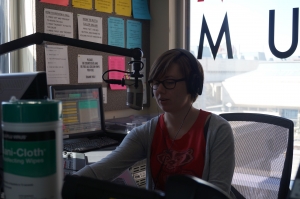
Photo by Abbey Schneider.
Tell me a little history about your station and where your station is now?
WSUM has undergone many changes since it’s founding in 1952. It’s had a number of call letter combinations and has been housed in a variety of places, including dorm basements and apartment buildings. After a long history of challenges, the first official broadcast of WSUM (as we know it today) aired on February 22, 2002 at 2:22 PM. Currently, WSUM resides in a 6-studio suite on the campus of the University of Wisconsin-Madison. The station is run by a 15-person student staff, under the supervision of a General Manager and Technical Director.
[/fusion_builder_column][fusion_builder_column type=”1_1″ background_position=”left top” background_color=”” border_size=”” border_color=”” border_style=”solid” spacing=”yes” background_image=”” background_repeat=”no-repeat” padding=”” margin_top=”0px” margin_bottom=”0px” class=”” id=”” animation_type=”” animation_speed=”0.3″ animation_direction=”left” hide_on_mobile=”no” center_content=”no” min_height=”none”]
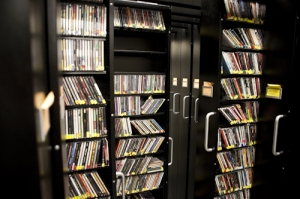
WSUM library.
What sets your station apart from other college radio stations?
From what I can tell, WSUM is significantly larger than most college radio stations. We have an absolutely beautiful studio filled with state-of-the-art equipment where our 200+ volunteer DJs host their weekly shows. Each and every one of these volunteers is incredibly dedicated to the station, having undergone at least three month’s worth of training before even making it to broadcast. As a freeform station, every host is given the opportunity to choose the format of his or her show and to present fresh content each week. I am proud to be a part of a radio station whose staff and hosts are committed to providing the highest quality programming day in and day out.
[/fusion_builder_column][fusion_builder_column type=”1_1″ background_position=”left top” background_color=”” border_size=”” border_color=”” border_style=”solid” spacing=”yes” background_image=”” background_repeat=”no-repeat” padding=”” margin_top=”0px” margin_bottom=”0px” class=”” id=”” animation_type=”” animation_speed=”0.3″ animation_direction=”left” hide_on_mobile=”no” center_content=”no” min_height=”none”]
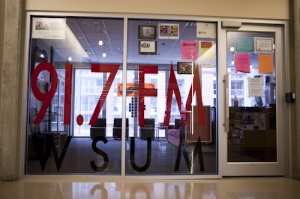
Welcome to WSUM!
Why did you choose to work at the radio station?
I chose to become involved with WSUM during my freshman year, at a time when I was struggling to find my niche on campus. I had met a lot of really great people at the UW, but it wasn’t until I walked into the station that I truly felt at home. Through my work here, I have met some of my closest friends and made those memories that everyone tells you will last a lifetime. I was also excited about the leadership opportunities available at WSUM. The station is very committed to providing a hands-on learning experience, which is something I came to appreciate very early on. Professionally, I’ve grown a lot because of my time as Program Director under the supervision of our General Manager, Dave Black. Overall, WSUM has played a really big role in shaping my college experience.
What’s the craziest thing you’ve ever done for your station?
I’ve interviewed some pretty interesting and high-profile musicians on behalf of WSUM. I think one of the crazier interviews I’ve done was with Andrew Dost, the pianist of the band fun., simply because I had to go through a lot of security clearance before even sitting down to do the interview. It felt really weird to be escorted by two security guards to the dressing room while I could hear Nate Ruess soundchecking one door over.
Stories like that are fleeting, though. From a less glamorous perspective, people always seem to be amazed by the fact that radio really is a 24/7 job. A lot of positions require you to be “on call” kind of all the time. So, I guess the 3 a.m. phone calls talking DJs down from equipment-induced panic may seem a little crazy. Honestly, though, I’d take this standard day-to-day craziness over meeting famous musicians anyways. That’s the true heart of the medium.
[/fusion_builder_column][fusion_builder_column type=”1_1″ background_position=”left top” background_color=”” border_size=”” border_color=”” border_style=”solid” spacing=”yes” background_image=”” background_repeat=”no-repeat” padding=”” margin_top=”0px” margin_bottom=”0px” class=”” id=”” animation_type=”” animation_speed=”0.3″ animation_direction=”left” hide_on_mobile=”no” center_content=”no” min_height=”none”]
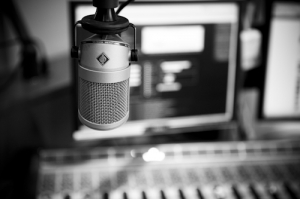
Inside the WSUM studio.
What’s the best part of college radio? And the hardest part?
The best part of college radio is that it’s a creative outlet for students; a chance to share a very personal part of you with an audience. In this way, there’s definitely a community-building potential in radio, especially at the college level. On the flip side of the same coin, the most difficult part of college radio is unearthing that potential. College radio has the chance to serve as an important tastemaker, both on campus and within the larger community, but it takes a certain professionalism to pull this off. At WSUM, all of our hosts are held to high standards and do a great job of presenting music and topics that really mean a lot to them in a way that becomes relevant to our audience. To be able to share that kind of content within our community is very important in creating strong bonds.
Want your station profiled? Email Jessica.
[/fusion_builder_column][/fusion_builder_row][/fusion_builder_container]


